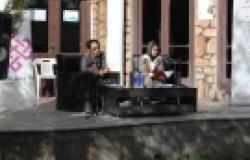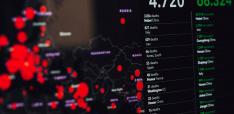How Performance Poetry can be a Tool to Advocate Human Rights

Raghavendra Madhu underscores how performance poetry, the burgeoning global phenomenon, is voicing an array of global concerns and proving to be a valuable tool in human rights advocacy.
Poetry is powerful; performance poetry is doubly powerful. Performance poetry, for all practical purposes can be interchanged with slam poetry, although performance poetry can be more inclusive by amalgamating with an array of other art forms like music and dance. Poetry of a particular region speaks immensely about that culture and politics. Globally, with the spread of performance poetry as an upcoming art form, there is an opportunity to use the art to propagate human rights. Performance poetry takes place in bars, theatres, streets, cafés, colleges, universities, private institutions, international organisations, and literary and cultural festivals.
Although the inception of ‘slam poetry’ is credited to have evolved in Chicago around mid-1980s, the Academy of American Poets rightly points out the roots of this movement to the Beat poets who popularised performance poetry throughout the 1950s, and the Negritude poets from 1930s who focused on acceptance of black literature and black consciousness.
With the spread of this art form across the world, it is being practiced not only in English but also in other major languages like French, German and others, but the event format remains the same, where individual poets perform original pieces to a varied audience. It is possible to understand the culture, practices, and policies of a particular place through individual experiences shared in the poem.
This commentary does not intend to provide an exhaustive list of slam poetry orgs, but to give an essence of the scene. The American performance poetry scene is buzzing with Button Poetry, founded in 2011, a Minnesota-based organization that develops, produces, and promotes effective performance poetry and their content is freely available on the internet. Their content addresses a range of social issues from gender stereotyping to black lives matter to world politics. Poetry Slam, Inc is another US-based organization that organizes the National Poetry Slam, the Individual World Poetry Slam, and the Women of the World Poetry Slam. Poetry organizations like Split This Rock (since 2008) bring together hundreds of poets and activists, and are a diverse group in terms of gender, race/ethnicity, age, physical ability, sexual orientation, and social class. Another poetry initiative, Darkmatter, is a group that focuses its poetry around gender self-determination, and racial justice.
European performance poetry initiatives like Kiezpoetry (Berlin) and Ligue Slam de France (Paris) are taking over the global slam poetry scene, with poets travelling throughout the country, learning and sharing from each other. Most importantly they are bi-lingual, practiced with translations, so that the art is not constrained by language.
In India, there are many organizations and groups like Poetry Couture, Mumbai Poetry Club, Delhi Poetry Festival, Airplane Poetry Movement, Bring Back the Poets, Performer’s Consortium, Delhi Poetry Slam, Mocking Birds, Pune Poetry Slam, Let’s Talk Life, Slip of Tongue, Slam Out Loud, and Free the Verse, that not only promote performing poetry as an art form but provide a platform for upcoming poets in local languages apart from English.
In Kabul poetry often stands for women rights. For example, the rural members of Mirman Baheer, a women’s literary society, gather whenever they can in secret and perform hidden from the men. Indeed, Pashtun poetry has long been a form of rebellion for Afghan women, belying the notion that they are submissive or defeated. In Burkina Faso, a civil society organization in 2017 launched a poetry video with strong messages about the importance of good nutrition, and it will be used to advocate among political and economic decision-makers. According to NCB news, the Pacific Islander poetry community are witnessing several powerful young voices writing and speaking on issues such as climate change, colonialism, language, identity, sexuality, and sovereignty. A few UN bodies and international human rights organizations also run poetry contests from time to time on issues such as world peace or human rights of refugees and asylum-seekers.
There is evidence to support that introducing arts and poetry in general education and curricula improve student imagination, narrative skills, and develop a sense of ethics towards society. Studies carried out in various parts of the world suggest that participatory social programs that include art and poetry induce positive changes and social cohesiveness in the community, improve the physical environment, and encourage empathy.
Poetry is also known to influence environmental politics in America. Public health interventions in Ghana have successfully used poetry, drama and songs to make behavioural change communication more effective. Studies on addressing depression through arts and poetry in an African-American community in Los Angeles have improved community’s capacity to communicate effectively about depression and reduce social stigma. In Uganda, as a part of the care to Schizophrenic patients, music and poems are shared and also encouraged to engage in it. This has decreased the stigma in the neighbourhoods.
The burgeoning practice of performance poetry as a global phenomenon, especially among the youth, demonstrates that it provides a platform to discuss social issues at multiple levels through personal experiences. There is no exhaustive list of human right issues that gets voiced through the poems but they are inclusive of social inequity, gender based violence, LGBTQ rights, mental health, adolescent sexual health, ageing, education, environmental issues, refugees, immigrants and minorities, and global conflict zones.
This art form is quintessential as policymakers globally are trying to frame methods of advocacy that provide alternatives to top-down approaches and to young artists building their own ways to voice their challenges. It is essential that governments and corporate bodies acknowledge and fund performance poetry as an upcoming form of art to strengthen the movement globally.
Raghavendra Madhu, Director at Po Art Initiative, New Delhi.
Relevant Links
https://www.un.org/disarmament/poetryforpeace/
https://nphic.confex.com/cdc/nphic16/webprogram/Paper37020.html
http://www.uhrsn.org/respond-human-rights-poetry-award/
http://www.giarts.org/article/integrating-nature-role-poetry-reorienting-environmental-politics
https://sustainabledevelopment.un.org/partnership/?p=11395


